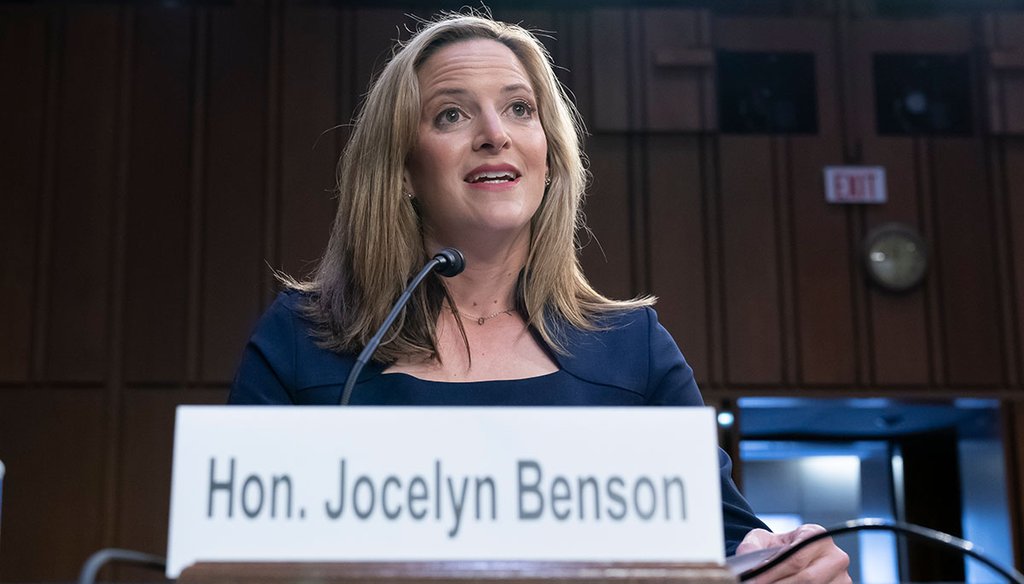Stand up for the facts!
Our only agenda is to publish the truth so you can be an informed participant in democracy.
We need your help.
I would like to contribute

Michigan Secretary of State Jocelyn Benson, testifies Aug. 3, 2022, at the Capitol in Washington, D.C. (AP)
If Your Time is short
-
Michigan Republicans have blasted actions Democratic Secretary of State Jocelyn Benson took ahead of the 2020 presidential election
-
Courts upheld her authority to mail absentee ballot applications to every voter in the state
-
Clerks verified voter signatures on absentee ballot request forms and ballot return envelopes
Hoping to score midterm election victories, Republican candidates and the Michigan GOP are focusing their ire on Democratic Secretary of State Jocelyn Benson — specifically, how she oversaw the 2020 election.
Michigan’s election system is the most decentralized in the U.S. The secretary of state plays a supervisory role in Michigan’s elections. Local clerks are responsible for running elections from registering voters to hiring poll workers.
In 2020, Benson sent absentee ballot applications to every registered voter in the state. It was an effort to deal with the COVID-19 pandemic. But for two years, Republicans have argued that Benson’s actions opened the door to fraud.
Hundreds of audits, reviews and court rulings upheld the election’s results. But claims that Benson acted improperly have persisted. Benson is running for reelection this fall. She faces Republican challenger Kristina Karamo, one of many election deniers backed by former President Donald Trump running for top election posts.
We looked at some of the allegations and suggestions of misconduct leveled against Benson. Here’s what you should know about those claims ahead of Michigan’s Nov. 8 general election.
Sixty-seven percent of Michigan voters in the 2018 election adopted a constitutional amendment to allow all voters to cast an absentee ballot. Before the change, Michigan voters younger than 60 had to meet stringent criteria to vote absentee.
The Michigan GOP has repeatedly blasted actions Benson took in the wake of the proposal's passage. "Without state legislative approval, Benson implemented no-excuse mail voting," the party has claimed in multiple statements. The party points to "mass mailing unsolicited ballot applications to all names on the voter list and for ballots to be counted that are received after the election is over" as examples.
But the Michigan GOP’s suggestion that Benson overstepped in implementing the newly adopted proposal lacks context.
Courts upheld Benson's authority to mail absentee ballot applications to all registered voters. And late-arriving ballots weren’t counted in 2020 after an appeals court reversed a lower court ruling. The GOP-led state Senate and House appealed the ruling after the Secretary of State’s Office — the defendant in the lawsuit — opted not to.
For the upcoming election, absentee ballots must be received by local clerks by 8 p.m. Nov. 8.
A Michigan Court of Claims ruled that Benson had the authority to send absentee ballot applications to every registered voter in the state in 2020.
In a 2-1 decision, a pair of Michigan Court of Appeals judges upheld the ruling: one the previous Michigan GOP nominee for the Michigan Supreme Court, the other appointed to the bench by former Republican Gov. Rick Snyder.
The Michigan Supreme Court declined to consider the matter following the election. GOP-nominated Justice David Viviano wrote the lone dissenting statement attached to the court's order saying he would have heard the case. But he provided no indication that he believed Benson's mailing violated the law. Republican-nominated justices held a majority on the court at the time.
Benson has said her office will not mail applications to all voters this election, but political parties can still do so and applications are readily available online.
GOP claims that thousands of ballots were fraudulently cast on dead voters’ behalf are inaccurate. A review by Michigan's Office of the Auditor General thoroughly debunked the charge. The vast majority — 98.8% — of votes cast by those who died were cast by voters who died less than 40 days before Election Day in 2020, the audit found. Under Michigan law, clerks must reject ballots cast by those who die before elections.
Nevertheless, Republicans have campaigned on the conspiracies. Former GOP gubernatorial candidate Kevin Rinke hit the airwaves ahead of the primary he lost with a false claim about dead voters, and how they always vote Democratic.
Ahead of the upcoming election, Democratic Gov. Gretchen Whitmer vetoed legislation that would have shifted responsibility for clearing dead voters from the rolls from local to county clerks, a change some election officials supported. In her veto letter, Whitmer wrote that the measure added "burdensome requirements that would distract from core election administration responsibilities."
Meanwhile, the Public Interest Legal Foundation sued Benson, alleging that the program in place to remove deceased voters from the rolls is inadequate. A federal judge recently denied Benson's request to dismiss the lawsuit. The group regularly files lawsuits against election officials alleging inadequate voter roll purging.
Over the past two years, Republicans have railed against private grants distributed to elections offices in 2020 from the Center for Tech and Civic Life, which received millions of dollars from Meta CEO Mark Zuckerberg and his wife, Priscilla Chan. Republicans have dubbed the donations "Zuckerbucks" and allege the funds were funneled to Democratic-leaning communities to boost turnout in those places.
A GOP-appointed judge dismissed a lawsuit over the donations in Michigan, finding that those who brought the lawsuit lacked standing. All communities that applied for the money received it. An appeal in the case is pending.
Since the 2020 election, GOP lawmakers in Michigan have repeatedly tried to bar private donations to help administer elections in Michigan, prompting gubernatorial vetoes.
"When I get into office, I will make sure we pass those bills right away," Whitmer's Republican challenger, Tudor Dixon, said at a debate this summer, referring to the legislation and other election law changes favored by GOP lawmakers. "We'll make sure that there are no 'Zuckerbucks' coming in and going into fishy places."
Those alleged "fishy places" included municipalities that former President Donald Trump won in 2020.
More than 450 Michigan municipalities received grants from the Center for Tech and Civic Life, according to tax filings. That included a large $7.4 million grant for Detroit — the state's largest voting jurisdiction — which went for President Joe Biden. It also included donations to smaller communities Trump won, such as Macomb County's Chesterfield Township, which received a $16,545 grant, and Ottawa County's Allendale Township, which secured a $15,398 grant.
The Federal Election Commission recently weighed in on allegations that the Center for Tech and Civic Life grants were distributed to boost turnout among Democratic voters. In a unanimous, bipartisan decision, the Federal Election Commission rejected claims the donations were designed to help Democrats in the 2020 election.
Since the last election, the Center for Tech and Civic Life has shifted to focus on advocating for greater government support to fund elections instead of philanthropy.
During their campaigns, some GOP gubernatorial candidates suggested that Michigan's clerks in 2020 failed to check signatures as required.
"We're going to make sure we have signature verification," former GOP gubernatorial candidate Perry Johnson said at one debate.
Before issuing a ballot, elections offices must check whether the voter's signature on an absentee ballot application and the signature in the voter's registration file "agree sufficiently," according to state law. Officials also must verify the signature on absentee ballot return envelopes before those votes are counted.
The law does not specify how election officials should perform either review to determine whether the signatures match.
The state's Bureau of Elections provided instructions for clerks in 2020.
"Signature review begins with the presumption that the voter's (absentee ballot) application or envelope signature is his or her genuine signature," the guidance stated. "If there are any redeeming qualities in the (absent voter) application or return envelope signature as compared to the signature on file, treat the signature as valid."
Some Republicans have suggested that that guidance amounted to eliminating the signature verification requirement altogether. But elections offices still verified signatures on absentee ballots before counting them. And clerks across Michigan collectively rejected 1,400 absentee ballots in the 2020 election because the voter's signature did not match the one on file. Michigan was on par with the national rejection rate for absentee ballots — around 1% — in 2020.
After the 2020 election, the Michigan Court of Claims struck down the signature guidance because it wasn’t vetted by the formal rulemaking process.
The court did not declare that election law bars clerks from presuming signatures are valid, as some Republicans have claimed.
Republican lawmakers and Benson found common ground on some tweaks to proposed signature verification rules. They agreed, for example, to eliminate the beginning presumption that the voter's signature is valid. But the GOP-led rules committee has left the proposed rules in limbo ahead of the upcoming election.
Our Sources
Michigan State Department, "Michigan's Elections System Structure Overview," accessed Sept. 14, 2022
The Detroit Free Press, "Voters approve Proposal 3, bringing sweeping changes to Michigan's election law," Nov. 6, 2018
House Fiscal Agency, "Ballot Proposal 3 of 2018," accessed Sept. 14, 2022
Michigan Department of State, "Rejected ballot data from Nov. 3 election demonstrates integrity of election," Dec. 2, 2020
The Detroit Free Press, "Appeals court reverses ruling that said late-arriving absentee ballots must be counted," Oct. 16, 2020
State of Michigan Court of Claims, opinion and order in cases 20-000091-MM, 20-000096-MZ, 20-000099-MM
The Detroit Free Press, "Michigan Court of Appeals rules Benson acted legally mailing out absentee ballot applications," Sept. 17, 2020
Michigan Supreme Court, order in Case No. 162007, Dec. 28, 2020
Michigan Office of the Auditor General, Performance Audit Report - Bureau of Elections - Department of State, March 2022
The Detroit Free Press, "Kevin Rinke ad falsely claims 'dead people always vote Democrat'," June 2, 2022
The Detroit Free Press, "Whitmer vetoes election bills, saying they 'fail to advance' safe and secure elections," Oct. 15, 2021
WWMT-TV, "First public debate in election cycle: Michigan GOP gubernatorial candidates squared off," May 12, 2022
Michigan Election Law, MCL 168.761, accessed Sept. 14, 2022
The Detroit Free Press, "Setting the record straight on claims made in support of Republican election bills," May 12, 2021
Michigan Court of Claims, opinion and order in Case No. 20-000198-MZ, March 14, 2022
Fox 2 Detroit, GOP candidates for governor debate at Mackinac Policy Conference, June 2, 2022
Center for Tech and Civic Life, 2020 tax filing, accessed Sept. 14, 2022
Federal Election Commission, MURs 7854 and 7946, July 31, 2022
Federal Election Commission, Factual and Legal Analysis MURs 7854, 7946, accessed Sept. 14, 2022
Center for Tech and Civic Life, Final Report on 2020 COVID-19 Response Grant Program and CTCL 990s, Dec. 15, 2021
The Detroit Free Press, "Michigan election officials in the dark on key procedures ahead of 2022 elections," Mar. 22, 2022
Gov. Gretchen Whitmer, SB 277 veto letter, Oct. 15, 2021
Elections Performance Index, "A Deep Dive into Absentee Ballot Rejection in the 2020 General Election," Dec. 16, 2021
Secretary of State’s Office, email exchange, Sept. 6, 2022 and Sept. 7, 2022
Brennan Center for Justice, "Public Interest Legal Foundation Drops Meritless Voter Purge Lawsuit Against Detroit," Jun. 30, 2020
ProPublica, "A Conservative Legal Group Significantly Miscalculated Data in a Report on Mail-In Voting," May 2, 2020












































